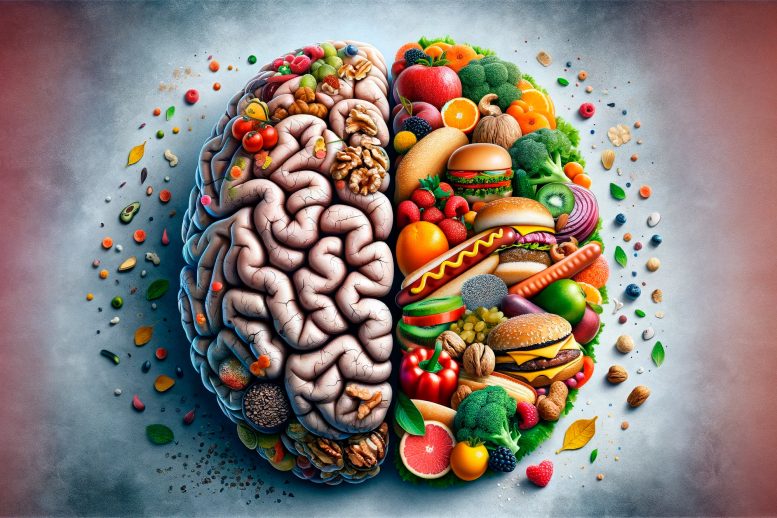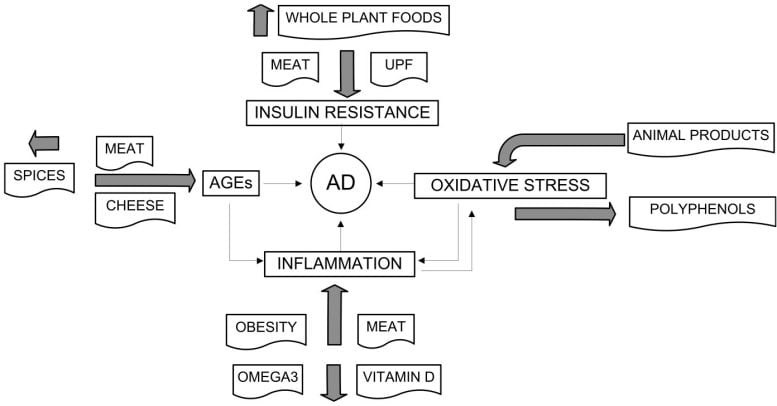
A new study reveals that plant-based diets, like the Mediterranean diet and traditional diets in Asia, reduce Alzheimer’s risk compared to the Western diet. The study links diets high in saturated fats, red meats, and ultra-processed foods with increased Alzheimer’s risk. Protective foods include vegetables, fruits, legumes, nuts, and whole grains. Credit: SciTechDaily.com
Research shows plant-based diets reduce Alzheimer’s risk, contrasting with the harmful impact of Western diets rich in meats and processed foods. Rising U.S. obesity trends suggest a significant increase in Alzheimer’s rates by 2038.
In a detailed study, “Diet’s Role in Modifying Risk of Alzheimer’s Disease: History and Present Understanding” published in the Journal of Alzheimer’s Disease, we can finally see which diets are helpful in reducing the risk of developing Alzheimer’s disease. The role of diet in modifying the risk of Alzheimer’s disease is discussed in detail. Diets that are more plant-based, like the Mediterranean diet and traditional diets in China, Japan, and India, are shown to reduce risk, especially when compared to the Western diet.
Dietary Transitions and Alzheimer’s Risk
Alzheimer’s disease rates rise in these countries as they make the nutrition transition to the Western diet. This study identifies dementia risk factors including higher consumption of saturated fats, meat, especially red meat such as hamburgers and barbeque as well as processed meats such as hot dogs, and ultra-processed foods high in sugar and refined grains.
Understanding Food Impact on Alzheimer’s Risk
This review also lets us know why certain foods increase or reduce risk of Alzheimer’s disease. For example, meat raised risk of dementia the most by increasing risk factors such as inflammation, insulin resistance, oxidative stress, saturated fat, advanced glycation end products, and trimethylamine N-oxide. This study also outlines several foods that are protective against Alzheimer’s disease, such as green leafy vegetables, colorful fruits and vegetables, legumes (like beans), nuts, omega-3 fatty acids, and whole grains.

Effects of specific dietary food groups and factors on risk of Alzheimer’s disease. Credit: Steve Blake 2023
Ultra-Processed Foods and Health Risks
Ultra-processed foods can increase the risk of obesity and diabetes, themselves risk factors for Alzheimer’s disease. Ultra-processed foods often lack the very ingredients found in whole plant foods that keep dementia away, such as anti-inflammatory components and antioxidants.
Socioeconomic Factors in Diet Choices
Poverty is an important driver of Alzheimer’s disease in the U.S. since ultra-processed foods and meat are cheaper sources of energy than fruits, vegetables, whole grains, and other more nutritious foods, thus promoting obesity.
Projected Increase in Alzheimer’s Rates
The paper also suggests that Alzheimer’s disease rates in the US are projected to increase by 50% from 2018 levels by 2038. This calculation is based on comparing trends of obesity in the US with Alzheimer’s disease trends. This comparison shows a 20-year lag between obesity rates and Alzheimer’s disease rates. This estimate is very close to the estimate published by the Alzheimer’s Association in 2018, an estimate of a 56% increase. Our estimate suggests that the rising trend of obesity, due to consumption of meat and ultra-processed foods, is the force driving dementia. Although our personal risk of Alzheimer’s disease can be reduced with diet, it is expected that those who continue to eat the Western diet will continue to have a higher risk.
Expert Opinions on Diet and Alzheimer’s
“Grant and Blake comprehensively review and synthesize the role of dietary factors in Alzheimer’s disease. Evidence from diverse perspectives support that a diet that emphasizes fruits, vegetables, legumes, nuts, whole grains, and…de-emphasizes meat, especially red meat, saturated fats, and ultra-processed foods is associated with lower risk of Alzheimer’s disease. Physical inactivity and obesity also contribute to higher risk. In addition, the dietary and lifestyle patterns associated with higher risk of Alzheimer’s disease are known to affect the constellation of mechanisms believed to increase risk, including inflammation, insulin resistance and oxidative stress, among others. Grant and Blake make a strong case that, while further research is needed to better understand the mechanisms, diet and lifestyle factors linked to diabetes, cardiovascular disease, and some cancers are likely to influence risk of Alzheimer’s disease.”
— Edward Giovannucci, MD, ScD, Professor of Nutrition and Epidemiology, Harvard University.
“Grant and Blake provide a comprehensive review on the dietary and other factors that affect the risk of Alzheimer’s disease (AD). Apart from the particular type of diet they demonstrate that the consumption of red meat, insulin resistance, obesity, reactive oxygen species, and oxidative stress, phytochemicals and homocysteine amongst other factors interact with neuroinflammation and play a major role in the aetiology of AD. This treatise provides an excellent overview of modifiable risk factors for AD.”
— Paul Marik, MD, Chairman and Co-Founder, FLCCC (Front Line COVID-19 Critical Care Alliance).
Reference: “Diet’s Role in Modifying Risk of Alzheimer’s Disease: History and Present Understanding” by William B. Grant and Steven M. Blake, 28 October 2023, Journal of Alzheimer’s Disease.
DOI: 10.3233/JAD-230418








While I can agree with the authors in general about the adulterated, toxic Western Diet, as a now senior lay victim/discoverer with a family history of very, very mild food allergies and dementia who first wrote the FDA (with replies, on file) on some of this eighteen years ago in October of 2005, not only do the authors fail to be comprehensive but they are too-typical of federal authorities and mainstream medicine professionals allergy, FDA approved food poisoning and excessive related/resultant medical error ignorant and incompetent. Furthermore, avoiding animal proteins for about twenty-eight years for allergy reasons in conjunction with failed medical testing resulted in a serious personal calcium deficiency (including temporary short-term memory deficits) by 2009 and by addressing that by supplementing with calcium carbonate which binds with phosphorus a very serious phosphorus deficiency by mid-March of 2021, which I’m still addressing on my own at-home in late 2023. And, there are other micronutrients in meats you just won’t find in plants.
Eating meat causes dementia now? LMFAO
As Elon would say “Go F Yourself”
They are really really pushing the eat plants and bugs campaign hard.